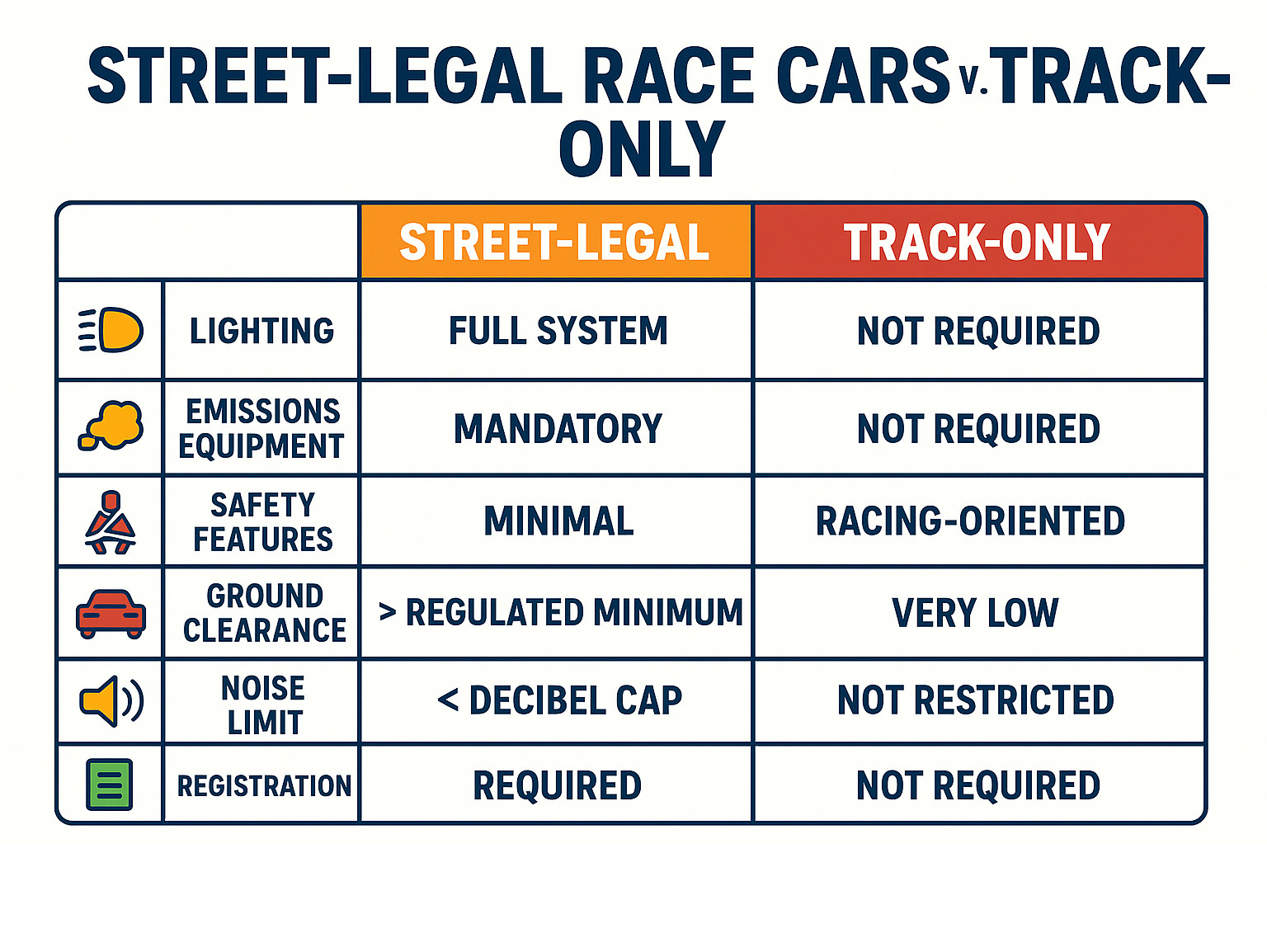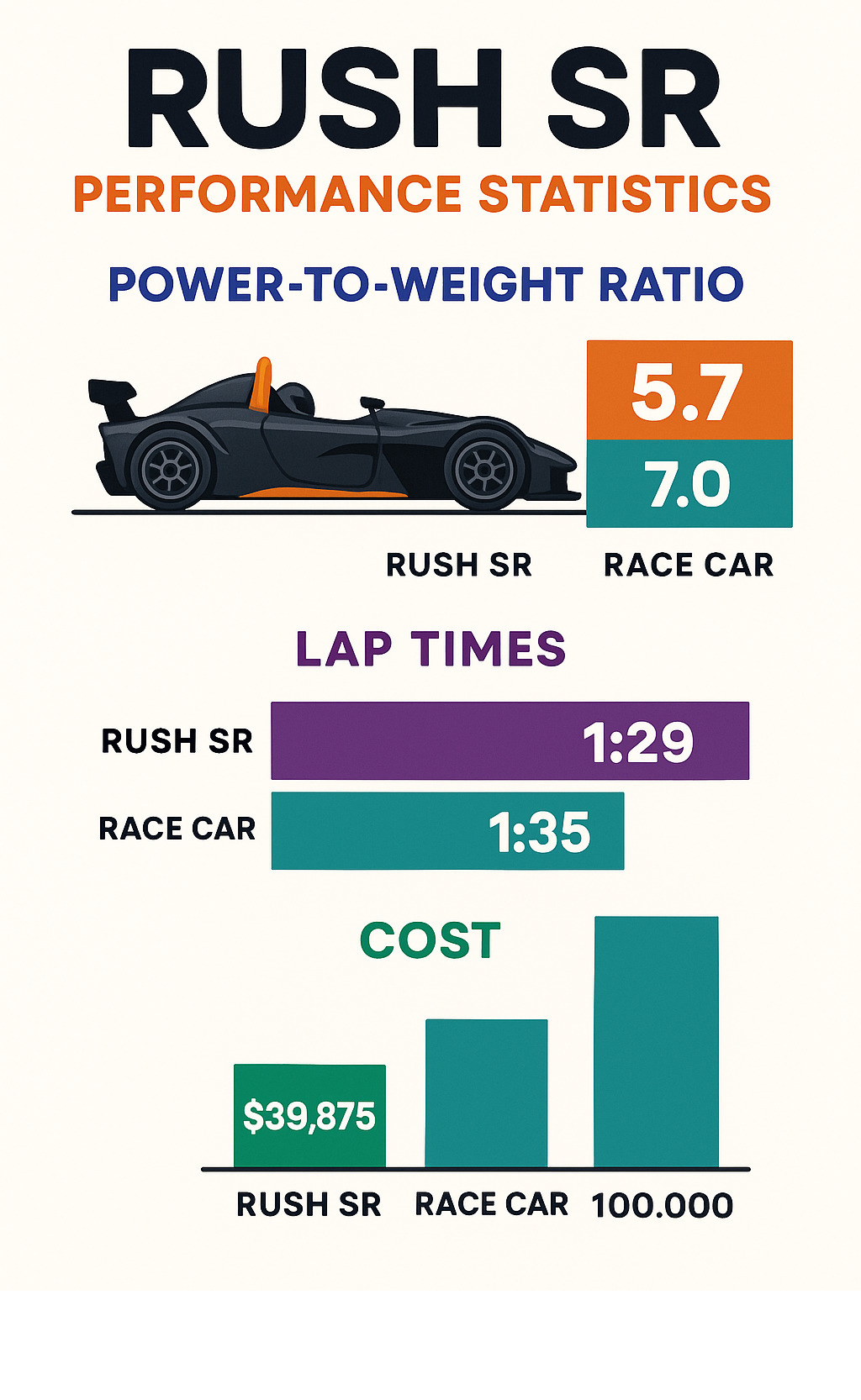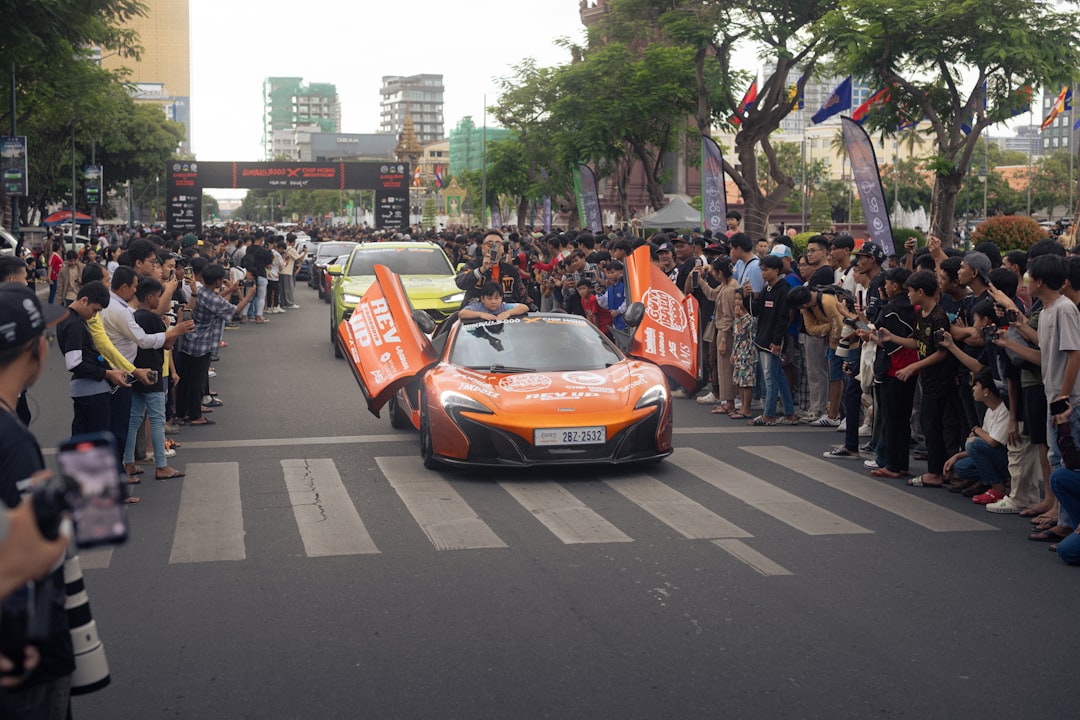Street Legal Race Cars: 10 Best Thrilling Picks 2025
The Ultimate Dual-Purpose Performance Machines
Street legal race cars offer the perfect blend of track-day performance and daily driving capability. These specialized vehicles bridge the gap between purpose-built race cars and regular sports cars, allowing enthusiasts to drive to the track instead of trailering their machines.
Quick Answer: What Are Street Legal Race Cars?
– Definition: Race-spec vehicles that meet DOT requirements for public road use
– Key Features: Full lighting systems, emissions compliance, proper ground clearance, and safety equipment
– Price Range: $20,000 to $150,000+ depending on make and modifications
– Popular Models: Porsche 911 GT3 RS, BAC Mono, Ariel Atom, Factory Five 818S
– Main Appeal: Drive to work Monday through Friday, dominate the track on weekends
The appeal is obvious. Instead of owning separate vehicles for commuting and racing, you get one machine that handles both jobs. As one racing enthusiast put it: “Our drivers keep passing GT cars costing $150,000 or more” – proving that street legal race cars can deliver serious performance without breaking the bank.
Demand for these dual-purpose machines has surged recently. Listings for street legal race cars now receive up to 4x more views than track-only vehicles on major motorsport platforms.
The trade-off? You’ll deal with a harsh ride, limited comfort features, and higher maintenance costs compared to regular sports cars. But for driving enthusiasts who want maximum performance without the hassle of trailers and transport logistics, street legal race cars represent the perfect compromise.

Key terms for street legal race cars:
– race car driver career path
– race car suspension tuning
– race car telemetry systems
What Makes a Race Car Street Legal?
The difference between a track-only beast and a street legal race car comes down to meeting the Department of Transportation’s requirements. It’s not as simple as bolting on headlights and calling it a day.
Street legal race cars must satisfy both performance enthusiasts and DOT inspectors, creating an interesting engineering challenge.
The essential requirements include DOT-approved lighting systems with headlights, taillights, turn signals, and hazard lights. You’ll also need proper bumpers with adequate ground clearance, mirrors, and a functional horn.
License plate mounting points are mandatory, along with emissions control systems that meet your state’s standards. Safety equipment gets tricky – you need three-point safety belts rather than racing harnesses for street use, plus regulated noise limits that require proper muffler systems.
Don’t forget basics like a windshield with wipers and proper VIN assignment with legal title documentation.
Many street legal race cars are cleverly built to comply with both SCCA and NASA club racing regulations while meeting road requirements. This dual compliance is the holy grail – you can compete in sanctioned motorsport events and drive home without needing a trailer.
| Requirement | U.S. Standard | EU Standard |
|---|---|---|
| Ground Clearance | 4-6 inches (varies by state) | 100mm minimum |
| Noise Limits | 95 dB maximum | 74 dB maximum |
| Lighting | DOT approved | ECE approved |
| Emissions | EPA compliant | Euro 6 compliant |
| Safety Belts | 3-point required | ECE R16 approved |
Key Legal Requirements in the U.S.
Federal DOT standards set the baseline, but each state adds its own requirements. Here’s what every street legal race car absolutely must have.
Safety equipment tops the list. You need three-point seat belts – those racing harnesses might look cool, but they won’t pass inspection. DOT-approved lights and reflectors are non-negotiable, along with a functional muffler system that keeps noise levels reasonable.
The windshield must be safety glass with working wipers. Legal documentation can make or break your project. A valid VIN and proper title are essential, plus current inspection certificates in states that require them.
Structural requirements get specific. Most states require minimum ground clearance of 4-6 inches, functional doors with exterior handles, and standard steering wheels instead of removable racing wheels.
Here’s a success story: Andre Miller successfully licensed a factory COPO Camaro that was originally built as a race-only vehicle. He classified it as a homebuilt car in Louisiana, added required equipment like horn, turn signals, and door locks, then obtained a VIN through state procedures.
How Street Legal Race Cars Differ From Track-Only Builds
The compromises required for street legality go beyond just adding lights and mirrors. Street legal race cars must balance performance with practicality.
Weight becomes your enemy. Full interior trim and sound deadening can add 100-300 pounds. Emissions equipment including catalytic converters pile on more weight, along with complete lighting systems and wiring harnesses.
Performance takes a hit in several areas. Suspension settings must be softer for road comfort, and ride height increases to meet ground clearance requirements. Muffled exhaust systems reduce power slightly, and aggressive aerodynamics often get toned down.
Safety modifications need street-friendly adjustments. Roll cages require padding for street use. Racing seats might need swapping for DOT-approved units, and harness bars often get removed in favor of standard seat belt mounting points.
Track-only builds can delete everything non-essential, run racing fuel, use straight-pipe exhausts, and optimize purely for lap times. Street legal race cars must make peace with compromise – but the payoff is driving your race car to the grocery store on Tuesday and to the track on Saturday.
Top Street Legal Race Cars You Can Buy Today

The street legal race cars market has exploded in recent years. You can find everything from $20,000 budget builds to $150,000+ exotic machines.
Street legal race cars represent less than 5% of all race car listings, but they’re getting four times more views than track-only vehicles. The average price range sits between $20,000 to $150,000, with popular models being various Porsche 911 variants, BMW M3s, and Ford Mustang builds.
These machines tend to hold their resale value better than track-only builds since more people can actually use them. For technical details, check out our Sports Car Specifications guide.
Lightweight Exotics Under 2,500 lbs
These cars make physics professors weep with joy. The formula is simple: take everything away except what you need for speed, add just enough equipment to keep the DMV happy.
The BAC Mono sits at the top of this food chain. For $180,000+, you get a single-seat missile with a 2.3L turbo four-cylinder pumping out 340 hp in just 1,223 pounds. That means 0-60 mph in 2.7 seconds and a 170 mph top speed.
The carbon-fiber monocoque weighs just 143 pounds and exceeds FIA structural standards. It’s essentially a Formula car that someone convinced the government was fine for grocery runs.

The Ariel Atom 4 takes a different approach. For around $75,000, you get a 2.0L turbo Honda K20C engine making 320 hp in a 1,312-pound package. The 0-60 time of 2.8 seconds is impressive, but the 0-100 mph sprint in 6.8 seconds is where things get ridiculous.
One reviewer captured the Atom experience: “The Atom has a reputation as a fun car, but the fact it’ll pull more lateral G in a corner than a Porsche GT3 is outright hilarious.” The exposed chassis design means you feel everything – wind, acceleration, and cornering forces hit you directly.
The Elemental RP1 represents the pinnacle of lightweight engineering at $200,000+. The 2.3L Ford EcoBoost produces 370 hp in a 1,366-pound carbon-fiber tub. The real party trick is the aerodynamics – this thing generates 2,204 pounds of downforce at 150 mph.
“Everyday” Street Legal Race Cars
These machines offer the best compromise between genuine track performance and the ability to drive them without requiring a chiropractor.
The Porsche 718 GT4 RS perfectly embodies this balance. At $144,050, you get a 4.0L naturally aspirated flat-six producing over 400 hp, paired with track-focused suspension that somehow still works on real roads.
The 2023 Chevrolet Corvette Z06 brings American muscle with its 5.5L naturally aspirated V8 pumping out 670 hp. The advanced aerodynamics package makes it look serious, but it’s surprisingly comfortable for daily use.
For value, the Honda Civic Type R at $44,390 represents incredible bang for buck. The 2.0L turbo four-cylinder produces over 300 hp through the front wheels, managed by a limited-slip differential that actually works.
Budget & Kit-Car Heroes
Kit cars and budget builds can deliver supercar-embarrassing performance for a fraction of the cost.
The Factory Five 818S might be the best performance bargain on the planet. For around $40,000 complete, you get a mid-engine layout with Subaru WRX drivetrain and adjustable suspension. The performance numbers are impressive – 56 seconds at Lime Rock Park.

The Rush SR at $39,875 proves that lightness trumps power. With just 145 wheel horsepower in a 1,130-pound package, it’ll hit 0-60 mph in 3.3 seconds. The sequential paddle-shift transmission comes standard.
The Caterham Seven 620R brings British engineering to the lightweight party. The 2.0L boosted Duratec four-cylinder makes 309 hp in a 1,349-pound package, good for a 0-62 mph time of 2.79 seconds.
For insights into what makes these machines work, check out our Race Car Suspension Tuning guide.
Ownership & Compliance: Costs, Insurance, Maintenance
Owning street legal race cars isn’t cheap, but for many enthusiasts, the thrill makes every penny worth it.
The real numbers: Purchase prices range from $20,000 for a well-built kit car to over $150,000 for exotic machines. Annual operating costs typically run between $3,000 and $12,000, covering specialized maintenance to track day expenses.
Insurance presents the biggest headache. Specialty coverage often costs 2-3 times more than regular car insurance, assuming you can find coverage. Track day coverage usually requires a separate policy altogether.
Street legal race cars typically hold their value better than track-only builds due to broader market appeal. Some limited-production models even appreciate over time.
Track day expenses add $200-$500 per event, plus inevitable tire and brake wear. One owner goes through performance tires every 3,000 miles of mixed driving.
For budget-conscious enthusiasts, our guide on Sports Cars with Low Repair & Maintenance Costs offers valuable insights.
Pros & Cons of Owning Street Legal Race Cars
The appeal is undeniable – drive to the track instead of trailering your race car. One vehicle handles both daily commute and weekend track sessions. This dual-purpose capability means better resale value, plus you join a unique community of enthusiasts.
But reality hits in traffic. The harsh ride quality that makes these cars capable on track becomes a liability during daily commutes. Maintenance costs run high, and service intervals can be shocking. Limited cargo space means strategic grocery planning.
Insurance challenges create ongoing stress, and dual-use nature means accelerated wear on expensive components. One owner replaces brake pads every 8,000 miles due to aggressive driving and regular track sessions.
Real-world perspective: Despite challenges, one enthusiast drove their street legal race car over 1,000 miles on the Hot Rod Power Tour, averaging more than 20 MPG from an 807 HP turbocharged LS7 engine.
Getting Insured & Staying Covered
Finding insurance for street legal race cars requires patience and persistence. Regular insurers often refuse coverage once they spot racing modifications or learn about track usage.
Specialty insurers like Hagerty, Grundy, and American Collectors understand modified vehicles. Agreed-value policies protect against depreciation disputes, crucial when your car’s value depends on specialized modifications.
Track day exclusions appear in virtually every standard policy. You’ll need separate coverage for track events, costing several hundred dollars per event. Mileage restrictions are common – expect limits between 2,500 and 7,500 miles annually.
The key is complete transparency. Disclose all modifications upfront to avoid claim denials later. Shop multiple specialty insurers for the best rates.
For comprehensive information on specialty insurance options, this detailed guide on racing vehicle coverage provides valuable insights.
Converting Track Monsters into Street Legal Race Cars

Taking a purpose-built race car and making it street legal requires patience and the right approach. Conversion costs range from $8,000 to $28,000 depending on your starting point. Basic lighting and safety equipment runs $2,000 to $5,000, while emissions compliance systems can hit $3,000 to $8,000.
Andre Miller proved even unlikely candidates can become street legal. He took a factory COPO Camaro – delivered without a VIN or street equipment – and successfully licensed it in Louisiana. Miller added required horn, turn signals, and door locks, installed air conditioning, then worked through Louisiana’s homebuilt vehicle classification to get an official VIN.
His success wasn’t luck – it was proper planning, understanding state requirements, and executing each step correctly. The result? A genuine factory race car he can legally drive anywhere.
Street legal race cars conversions succeed when you treat them as engineering challenges, not weekend projects. Every state has different requirements, inspection procedures, and documentation processes.
Step-by-Step Conversion Guide for Street Legal Race Cars
Your baseline assessment determines everything else. Spend time upfront evaluating current safety equipment, researching your state’s specific requirements, and honestly budgeting for parts, labor, and certification costs.
Parts sourcing becomes the next challenge. DOT-approved lighting systems meet specific beam patterns, brightness requirements, and durability standards. The same goes for mirrors, seat belts, and emissions equipment.
Emissions compliance trips up more conversions than any other factor. Modern states require functional catalytic converters, proper oxygen sensors, and sometimes OBD-II diagnostic systems.
The paperwork phase separates successful conversions from abandoned projects. VIN assignment for homebuilt vehicles involves specific forms, inspections, and waiting periods.
Test driving reveals issues paperwork can’t predict. Street-legal ride height might create handling problems. Suspension settings that work at racing speeds can feel harsh or unstable in normal driving.
For mastering your newly street-legal machine, check out our guide on Advanced Car Driving Techniques.
When a Conversion Doesn’t Make Sense
Some race cars are incredible at what they do, but completely wrong for everyday situations.
NASCAR stock cars represent the classic “just because you can doesn’t mean you should” example. These tube-frame machines were never designed with street use in mind. Conversion costs routinely exceed $50,000, and the result satisfies neither street nor track requirements.
LMP prototypes face similar challenges with even more complications. The extreme aerodynamics create impossible ground clearance issues on real roads. Speed bumps become impossible obstacles.
Here’s our reality check: if conversion costs exceed 50% of the vehicle’s post-conversion value, you’re better off buying a purpose-built street legal race car instead. Budget overruns happen because race cars reveal problems gradually. What starts as simple lighting installation turns into rewiring the entire electrical system.
Resale challenges compound the financial reality. Converted race cars occupy an awkward market position – too compromised for serious racers, too harsh for most street car buyers.
The smart approach? Start with race cars designed for dual duty, or buy factory street legal race cars engineered from the beginning to handle both roles.
Frequently Asked Questions about Street Legal Race Cars
What is the difference between street legal race cars and regular sports cars?
Regular sports cars are designed to be comfortable daily drivers that can handle spirited weekend driving. Street legal race cars flip that priority – they’re built for maximum track performance and then accept the bare minimum equipment needed to be road legal.
The differences show up everywhere. Suspension systems in street legal race cars are typically adjustable and track-focused, which means they’ll rattle your teeth on city streets. Weight savings are dramatic – everything from sound deadening to cup holders gets deleted for performance.
Aerodynamics tell the story visually. While regular sports cars have subtle styling, street legal race cars sport aggressive wings, splitters, and body work that generate meaningful downforce. The trade-off? You’ll scrape on every driveway.
Inside, expect racing seats that hold you tight during cornering but aren’t great for long commutes. Many have roll cages requiring padding for street use. Forget fancy infotainment systems.
The maintenance reality hits hardest. While your friend’s Corvette needs oil changes every 7,500 miles, street legal race cars often require attention every 1,000-3,000 miles.
How much does it cost to maintain street legal race cars annually?
Annual maintenance costs range from $3,000 to $12,000 depending on what you’re driving and how often you track it.
On the budget end around $3,000, you’ll find purpose-built cars like the Rush SR. These machines are designed for racing from the ground up, so they’re actually reliable.
Mid-range costs of $5,000 to $8,000 apply to modified sports cars that see regular track duty. This includes heavily modified Miatas, BMW M3s, or Porsche 911s converted for dual use.
The expensive end at $8,000 to $12,000 covers exotic street legal race cars with complex systems like BAC Monos or Ariel Atoms.
Tires alone can cost $1,200 to $3,000 annually if you’re using track-compound rubber. Brake components represent another major expense at $800 to $2,500 yearly. Engine maintenance costs $1,000 to $4,000 annually for high-performance engines needing frequent oil changes and premium synthetic oils.
Are there insurance companies that cover street legal race cars used on track days?
Yes, but it’s complicated. Regular auto insurance companies avoid street legal race cars. You’ll need specialized coverage.
For street driving, specialty insurers like Hagerty, Grundy, and American Collectors will cover modified vehicles. Expect to pay two to three times what you’d pay for regular car insurance.
These policies often include agreed-value coverage, crucial for modified vehicles. Most specialty policies include annual mileage restrictions of 2,500 to 7,500 miles.
Track day coverage requires separate insurance entirely. Companies like Lockton Motorsports and RLI offer event-specific policies costing $200 to $800 per track day.
Never try to use regular insurance for track activities. Insurance companies consider racing or track driving excluded activities. Always disclose modifications and intended use upfront.
Conclusion
Street legal race cars represent something special – they’re the perfect answer for enthusiasts who can’t choose between blistering track performance and the freedom to drive wherever the road takes them. Whether you’re eyeing a $40,000 kit car build or dreaming of a $200,000 exotic, these machines deliver an ownership experience unlike anything else.
The investment outlook keeps getting brighter. As track day events explode in popularity and driving enthusiasts seek alternatives to cookie-cutter sports cars, well-maintained street legal race cars are holding their value remarkably well. Limited-production models often outperform the broader collector car market.
Finding the right use makes all the difference. Daily driving is technically possible, but your spine might complain after a week of commuting in race-tuned suspension. These machines shine on track days where you can drive to the event, release their full potential, then drive home grinning. They’re also fantastic conversation starters at car shows.
Weekend touring through twisty mountain roads reveals another dimension of street legal race cars. There’s something magical about carving corners in a machine born to race.
The future looks exciting with electric street legal race cars starting to emerge, promising instant torque and advanced electronics. Still, there’s something irreplaceable about the analog connection of a lightweight, naturally aspirated machine screaming through the gears.
Success with street legal race cars comes down to managing expectations honestly. These aren’t plush grand tourers or set-and-forget weekend toys. They’re purpose-built performance machines that happen to wear license plates. Maintenance bills will be higher, the ride will be harsh, and passengers might question your sanity. But if you’re prepared for these realities, you’ll find a driving experience conventional vehicles simply cannot match.
The thrill of racing on Sunday and commuting on Monday – all in the same machine – represents automotive enthusiasm at its purest. It’s about refusing to compromise on what matters most: the connection between driver, machine, and road.
For more insights into performance vehicle ownership and racing techniques, explore our comprehensive resources at carnews4you.com/category/resource-guide/. At Car News 4 You, we’re passionate about the intersection of car culture and automotive innovation, helping enthusiasts make informed decisions about their next performance machine.
Whether you choose a featherweight exotic, a carefully converted track car, or a purpose-built kit car, street legal race cars offer something truly special – the rare opportunity to own a machine equally at home setting lap records and picking up groceries.







